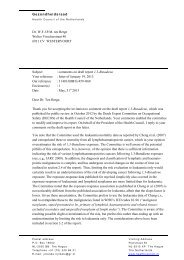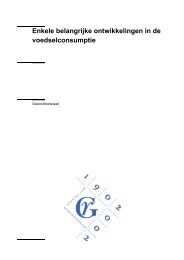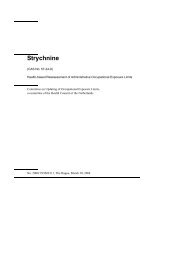Publication ( PDF , 981.92 KB ) - Gezondheidsraad
Publication ( PDF , 981.92 KB ) - Gezondheidsraad
Publication ( PDF , 981.92 KB ) - Gezondheidsraad
You also want an ePaper? Increase the reach of your titles
YUMPU automatically turns print PDFs into web optimized ePapers that Google loves.
Most of the research in non-academic institutes is in the form of separate ad hoc<br />
projects. These are mainly short-term projects concerned with the activities and<br />
participation of the hard of hearing and projects directed towards auditory aids<br />
and technology. Epidemiological research is hampered by the considerable<br />
diversity in terms and definitions, which makes it very difficult, if not impossible<br />
to combine different groups of data and registrations. Standardisation could do<br />
much to stimulate epidemiological research.<br />
With respect to primary prevention, behavioural-sociological research is necessary<br />
to determine how young people, but also adults, can be persuaded to avoid<br />
high-risk behaviour. With respect to secondary prevention, the implementation of<br />
the neonatal hearing screening should be strictly monitored. It is vitally important<br />
that the care chain is adapted to the new situation. Research into speech and<br />
language development can contribute to the detection of non-congenital hearing<br />
loss.<br />
Concerning the elderly, it is clear that an early diagnosis of hearing loss is vital for<br />
minimising the loss of residual hearing. The screening of persons aged 55 years<br />
and over is worthwhile, as long as this is preceded by research into the expected<br />
response and possible risk profiles. Of course there is an ongoing need for<br />
research into the causes (genetic and other) of hearing loss.<br />
A greater social awareness of what hearing loss is and of its possible consequences<br />
could contribute to an improved acceptance of people with hearing loss and might<br />
also have positive effect with respect to prevention. The Council recommends<br />
increasing this awareness by means of social-societal research and public<br />
information programmes.<br />
Social-societal research is also necessary to gain a better insight into the<br />
consequences of hearing loss and to improve the supervision of the hard of<br />
hearing in learning to cope with the hearing loss. A much heard complaint from<br />
interest groups and parents' associations is that tertiary prevention is all too often<br />
limited to the prescription of a hearing aid.<br />
At an international level the interest in hearing research is also limited, as can be<br />
seen from the very small number of European research projects. However, outside<br />
of the Netherlands there are a number of larger institutes that were founded with<br />
the intention of supporting hearing research (for example, the National Institute<br />
for Deafness and other Communication Disorders in the United States and<br />
Hörtech in Germany).<br />
6

















